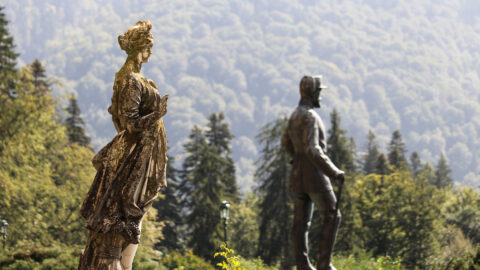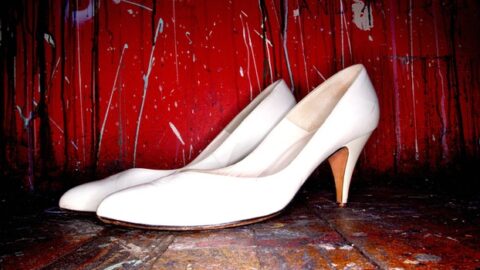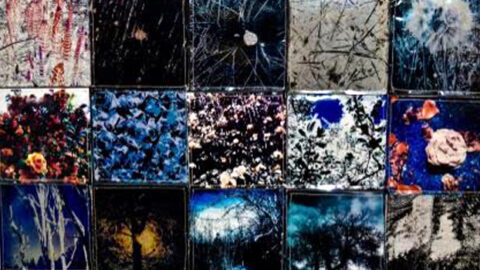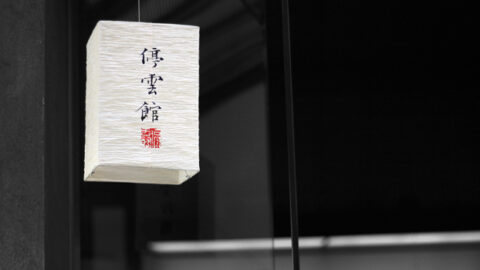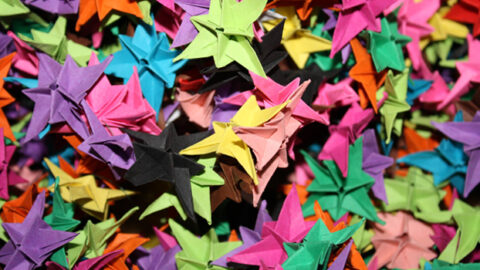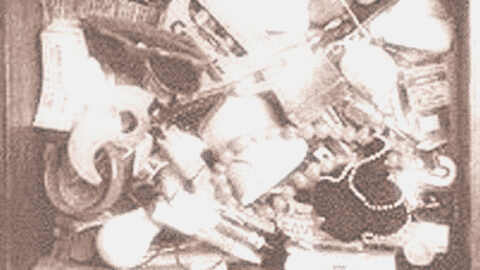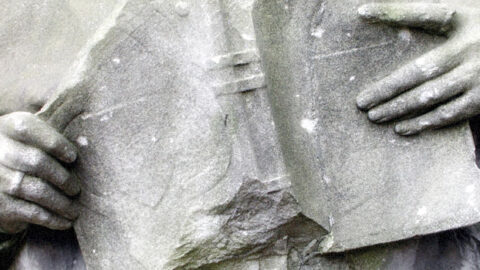A leaf blower is a strange object to base a poetry collection around, one might think. It is not beautiful, it is not a part of any regular person’s life for more than an afternoon each summer.
Reciting Poetry: The Power to Stun or to Heal
During the feverish summer of 2014, I began to fall in love.
With a new person. And with poetry anew.
Anne Boyer’s “Garments Against Women” has Heart, Soul, and Sarcasm
Anne Boyer ’s newest book, “Garments Against Women,” is a poetry-prose hybrid that glides between sentences, paragraphs, and chapters with a sense of purpose, leading the reader to paused reflection.
’s newest book, “Garments Against Women,” is a poetry-prose hybrid that glides between sentences, paragraphs, and chapters with a sense of purpose, leading the reader to paused reflection.
‘The First Language’ – An Interview with Amanda Huynh
The notion that fusion and exchange (of culture, of ideas) will result in evolution is central to Amanda Huynh’s poetry. This Texas native nursed a love of writing while earning an undergraduate degree in Biology at the University of Texas at Dallas. Huynh is currently earning an MFA in Creative Writing at Old Dominion University, where
‘What Cement is Made of’- An Interview with Daniel Donaghy
Daniel Donaghy is a writer, professor, father, and husband whose poetry evokes growing up in Philadelphia, the inspiration of his chapbook “What Cement is Made of,” a finalist for this year’s Anzaldúa Poetry Prize.
“empathy for cars / force of July” – An Interview with Poet Davy Knittle
By day, Davy Knittle is a PhD student at the University of Pennsylvania, and by night he’s an award-winning poet. Knittle’s interest in and love of poetry was piqued during high school, when he was taught for a year by poet Yolanda Wisher. While much of Knittle’s life is dedicated to and his writing and his studies, he also enjoys simple things,
Unleashing the Unconscious: Poetry, Place and Neuroscience in the Art of Kuma Kitsune
Above: Detail from Kitsune’s A Walk Through the Looking Glass.
Kuma Kitsune is a mixed-media artist and photographer living in Portland, OR. Her work incorporates a diversity of materials, such as fabric, projection film, tiny shreds of paper — and, in her most recent installment, other people’s poetry. More of her work can be seen here.
E. D. Watson: Your current work, A Walk Through the Looking Glass, is an assemblage of twenty-four individual pieces, titled with fragments of poetry produced by Hafiz, Ray Bradbury, Mary Oliver, Rimbaud and Lewis Carroll, which form a corresponding poem. Viewers are then invited to re-position the works and create their own poem from the new arrangement of the titles. Can you talk a little bit about how literature influences your work, and how you came to select these particular, seemingly disparate, writers?
Kuma Kitsune: I think what most influences my work is the Surrealistic concept of unleashing the unconscious.
Bad Kids at the Milk Tea Shop: Leisure Time, Reading and Writing in Chengdu and Neijiang, China
Luis Humberto Valadez was born and raised in Chicago Heights, Illinois. He received his MFA from the Jack Kerouac School of Disembodied Poets at Naropa. His publications include the poetry collection what i’m on from the University of Arizona Press (2009) and the book/music project Valid Lush from Plumberries Press. After completing a term of service with the Peace Corps in Neijiang, Sichuan, China, he was hired by Peace Corps China as a TEFL Manager and is currently based in Chengdu. More of his work can be found at here. Valadez takes his job supporting Peace Corps teachers seriously, and also tries to fit in a literary life.
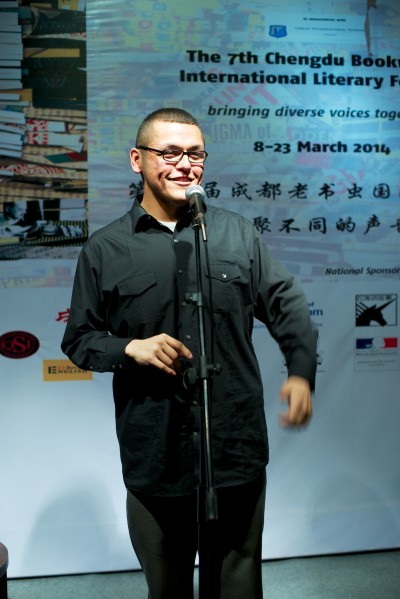
John Ashbery and the Eastern Bloc: The Absurd is Our Guide
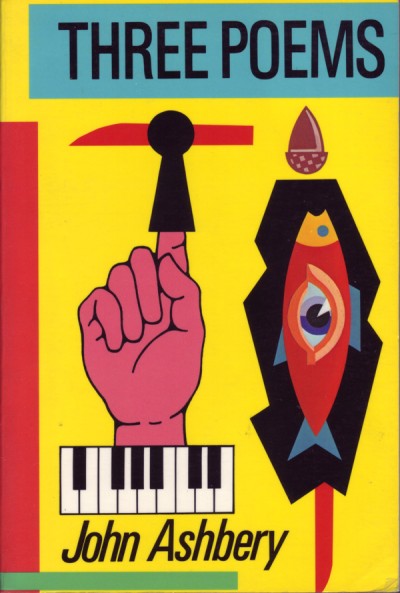 John Ashbery, My Guide
John Ashbery, My Guide
The past three decades have been an exciting time for poets from formerly Soviet nations. Many contemporary poets from this region came of age (and established their voices) while poetry was inextricably linked to rebellion against communist regimes. You were a protest poet—or you weren’t a poet. But after the dissolution of many corrupt governments in the 1980s, poets were able to inhabit or create different identities—even apolitical ones.
I find myself hungry for these voices, and want to hear their stories. I’ll be the first to admit I often lack the context for the works—and I’m reading English translations to boot. As an American reader, I lean on more familiar poets to be my guides. Slovenian poet Tomaž Šalamun has often cited his affinity for (and influence by) American poet John Ashbery. And so, Ashbery has been my escort through Šalamun and other poets from this region.
Rodney Gomez: 2014 Anzaldúa Poetry Prize Winner
Heather Kirn Lanier: A Poet Obsessed
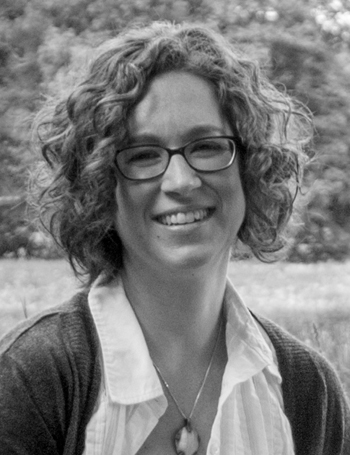 Heather Kirn Lanier’s poetry chapbook, Heart-Shaped Bed in Hiroshima, a finalist for the 2014 Gloria E. Anzaldúa Poetry Prize, reflects an obsession. But it should not surprise us that most of her work does this. Like many writers, she finds she must follow her obsessions wherever they lead.
Heather Kirn Lanier’s poetry chapbook, Heart-Shaped Bed in Hiroshima, a finalist for the 2014 Gloria E. Anzaldúa Poetry Prize, reflects an obsession. But it should not surprise us that most of her work does this. Like many writers, she finds she must follow her obsessions wherever they lead.
“The collection is about trying to understand the brutalities of war through mediated forms—memorials, museums, news headlines, biographers. It’s about trying to bridge the chasm between the citizen and the far-away war her country is waging. It’s about feeling responsible to bridge that gap, even while it’s ultimately impossible,” says Lanier.
Olivia Cronk: Junk Drawer Poet and Mood Thief
Olivia Cronk is one of two finalists for Newfound’s 2014 Gloria E. Anzaldúa Poetry Prize. Her sublime imagery, irreverence and precision of language struck the panelists and the judge. Coupled with her unique perspective on poetry, she is one to watch, if not to get to know. Look for her poetry in our print issue.
REGGIE CARLISE: Tell me about yourself.
OLIVIA CRONK: I live on the north side of Chicago, where I also teach writing at a small commuter university, Northeastern Illinois University. I teach both Introductory Compositio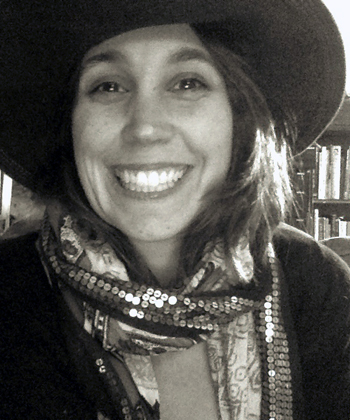 n and upper level Poetry Writing courses, so my artistic and professional selves are at once in competition with one another and deeply entangled.
n and upper level Poetry Writing courses, so my artistic and professional selves are at once in competition with one another and deeply entangled.
My first book, Skin Horse (Action Books, 2012), came out of the time of my early teaching life (adjunct work at sometimes three schools at once—this is likely a familiar routine to many Newfound readers) and those poems were an extreme examination of the domestic, often in the flavor of B Horror films, Vincent Price, Giallo, David Lynch, Clara Rockmore. I think those were very, very interior in part because I had such a hectic work life.
And now, my labor situation is a little smoother (or, rather: as smooth as might be expected in the fucked up economy of academic jobs), but I have a small child, and somehow I find myself writing only in long-form (it’s easier to simply “drop in” on a fresh page of an ongoing document)—I only want to work on manuscripts, not on discrete poems. My submission to Newfound’s chapbook contest is from a long poem, “Middle Mansion,” which is about genre, the Fantasy genre, fantasy, (the self inside of the place of) memory, fashion, early adulthood, and apocalyptic settings.
Who Decides the Humanities’ Future?
I’ve just stumbled across yet another depressing article about the bleak future of the English Major. They usually go something like this: People are reading less, it’s terrible, woe to we who write! I read these types of articles because they are posted in literary magazines, by and for people concerned with the decline of reading and literature. But I believe articles of this ilk may be missing the point.
However well-intended and meticulously researched, the journalistic approach of this type of article lacks the essence of the discipline they are discussing. Literature and the arts are not about facts and figures, they are about what it means to be human, hence the label: the Humanities. Literature seeks to expose the truths of human existence, the shared experience, the feeling of being alive. So, in my first post for Newfound, I find myself looking for my place in all this cognitive shifting sand.

